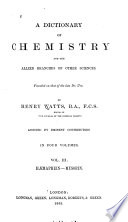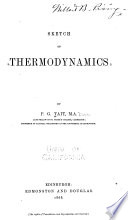 | 1843 - 714 pages
...dynamometrical apparatus attached to his machine, the author ascertained, that, in all the above cases, a quantity of heat, capable of increasing the temperature...pound of water by one degree of Fahrenheit's scale, is evolved with the magnetism which possesses a force sufficient to raise a weight of about 874 pounds... | |
 | British Association for the Advancement of Science - 1844 - 480 pages
...dynamometrical apparatus attached to his machine, the author has ascertained that, in all the above cases, a quantity of heat, capable of increasing the temperature...water by one degree of Fahrenheit's scale, is equal to a mechanical force capable of raising a weight of about 838 pounds to the height of one foot. On the... | |
 | American Academy of Arts and Sciences - 1890 - 404 pages
...also, and from these he reached the first determination of the mechanical equivalent of heat, namely. " The quantity of heat capable of increasing the temperature...degree of Fahrenheit's scale is equal to, and may be couverted into, a mechanical force capable of raising 838 pounds to the perpendicular height of one... | |
 | Joseph Jones - 1859 - 444 pages
...friction of bodies, whether solid or liquid, is always proportional to the quantity of force expended. 2. That the quantity of heat capable of increasing the temperature of a pound of water (weighed in vacuo, taken at between 55 and 60°) by 1° F. requires for its evolution the expenditure... | |
 | American Medical Association - 1859 - 740 pages
...friction of bodies, whether solid or liquid, is alwaya proportional to the quantity of force expended. 2. That the quantity of heat capable of increasing the temperature of a pound of water (weighed in vacuo, taken at between 55 and 60°) by 1° F. requires for its evolution the expenditure... | |
 | 1864 - 572 pages
...friction of bodies, whether solid or 'liquid, is always proportional to the quantity of work expended. 2d, The quantity of heat capable of increasing the temperature of a pound of water (wcighed in vacuo, and taken at between 55° and 60°) by 1° Fahr., requires for its evolution the... | |
 | Henry Watts - 1865 - 1110 pages
...work which would otherwise lie evolved in the form of heat From these facts he drew the conclusion, "That the quantity of heat capable of increasing the temperature of a Ib. of water by one degree J28 Fig. 549. Fig. 550. of Fahrenheit's ecale, is equal to, and may be converted... | |
 | Andrew Ure - 1867 - 918 pages
...action going ou. Mr. Joule has r roved Ly a scries of most satisfactory experiments, that: "Т1н> quantity of heat capable of increasing the temperature of a pound of water by one rlugree of Fahreuheit's scale is equal to, and may be converted into, a mechanical force capable of... | |
 | Peter Guthrie Tait - 1868 - 148 pages
...friction of bodies, whether solid or liquid, is always proportional to the quantity of work expended. 2d, The quantity of heat capable of increasing the temperature of a pound of water (weighed in vacuo, and taken at between 55° and 60°) by 1° Fahr., requires for its evolution the... | |
 | United States. Congress. Joint Committee on Ordnance - 1869 - 262 pages
...friction of bodies, whether solid or liquid, is always proportional to the quantity of tcork expended. 2d. The quantity of heat capable of increasing the temperature of a pound of water (weighed in vacuo, and taken at between 55° and 60° ) by 1° Fahr., requires for its evolution the... | |
| |